I wanted to see The Last Duel in theaters. It is a story that my partner was interested to see, and we were making tentative plans to see it. I'm still hesitant to go to a movie theater due to the ongoing COVID pandemic. I actually passed on seeing Spider-Man: No Way Home in the theater because I don't want to sit in such a crowded space with total strangers. I was actually kind of relieved that The Last Duel was bombing in theaters. It would mean that we could go see it in theaters, and I could be comfortable in the knowledge that we should expect to have no problems social distancing in the theater.
But real life happened. We got busy with stuff, and kept putting it off. Then my partner actually caught COVID, so we were self-quarantined for 2 weeks. By the time we would have had an opportunity to go to the theater, I think The Last Duel had already been pulled.
So when we were sitting around in the holiday week between Christmas and New Year, with plenty of free time on our hands, we saw it while scrolling through HBO Max and decided to finally watch it.
The structure of The Last Duel is quite unorthodox for a feature film. It abandons the typical 3-act structure of most mainstream movies in favor of more of kind of a 4-act structure, in which the first 3 acts retell the same events from 3 different characters' perspectives. There isn't technically a 4th act, as the climactic duel is actually part of the 3rd act, but as it's a culmination of all 3 characters' plots, I kind of see it as its own 4th act.
I'm on the fence about this particular style of story-telling. On the one hand, there's a lot of subtly and nuance that re-frames or re-contextualizes most of the events depicted. We get to see multiple characters' conflicting perspectives of the same events, and how one person can believe himself a hero, while everyone else might see him as a self-righteous dick.
However, I have two significant complaints with the structure of this film, in particular.
The first complaint that I have with The Last Duel is that the desire to re-tell the same events 3 times leaves little time for anything else. We get one scene early in the movie of De Gris and Carrouges fighting together on the battlefield. There's nothing else to help build up and develop the deep friendship and respect that they supposedly have. The audience is constantly being told that they are good friends, but all we ever see is petty bickering between them. We just have to take the characters' word for it that they were ever friends to begin with. [More]
b7718c92-7e52-493a-b5f7-6ddcf9286607|1|5.0
Tags:The Last Duel, Ridley Scott, Amazon Prime, movie theater, Jean de Carrouges, Jacques Le Gris, Marguerite de Carrouges, France, history, medieval, duel, court politics
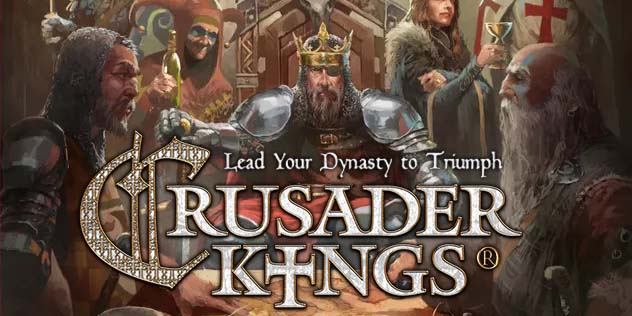
I wasn't very surprised to see a game like Sid Meier's Civilization adapted to a board game. Civ (the computer game) was always heavily inspired by board games to begin it, and so it's mechanics translated easily back into board game formats without losing much other than the broader scope of the PC game.
Paradox's Crusader Kings, on the other hand, is a totally different beast of a PC game. It is an insanely complicated, system-based blend of grand strategy game, RPG, and social sim. It simulates thousands of individual characters across hundreds of countries and duchies through dozens of generations. The possibility space is vast. As such, I would never have expected to see anyone attempt to try to boil down this deep historical simulation into a tabletop board game. Well, I guess I shouldn't say "never". In this age of every media property being adapted to board game formats, I suppose it was inevitable for someone to try.
And someone did try. In 2019, a year before the release of the Crusader Kings III PC game, Swedish board game manufacturer Fria Ligen ("Free League Publishing") released a board game version licensed by Paradox. I received the game as a gift last fall (during the height of social distancing during the COVID-19 pandemic), and so didn't get to start playing the game until well into 2021, when we finally felt a little more comfortable meeting up with friends.
As much a story-generator as a board game
For any PC players coming to the board game, there is something very important that you should know about Crusader Kings: the Board Game: it's focus is largely on the story-telling aspect of the Crusader Kings experience. If you play the Crusader Kings PC game as a hardcore strategy game, then you will probably find the board game lacking in that respect. The Crusader Kings board game is as much a story generator as it is a strategy game -- perhaps moreso.
As a story generator, my friends and I have found Crusader Kings to be very entertaining. It's certainly one of the better story-telling games that I've ever played.
Each action card will include a random event that is either disruptive to the current player,
or which benefits another player.
The way that Crusader Kings creates its little stories is through the random events of each player's action cards, and through the resolution of events by drawing trait tokens. Each turn, a player plays a pre-selected card from their hand. You perform your chosen action, and then you resolve a random event on the card. All cards, except for the "Crusade" action cards, will have a random event that is either harmful to the active player, or which provides a benefit to another player (usually the next player in the turn order).
Many actions and card events will also require that the player draw traits from a bag (similar to a die roll in most other games). Each player character starts with a pre-determined set of traits at the start of the game, and can acquire new traits through marriages, succession, or other events. All your traits go into a bag, and you draw one or more blindly from the bag to resolve a given trait check and determine the outcome of an event.
Player actions, card events, and trait draws, thus combine together to create emergent stories in both the short and long term. Sometimes these little stories can play out over the course of a few actions or turns. Other times, game-long narratives can form. [More]
34573e81-f1df-4d97-b5bc-74233cbd3e71|0|.0
Tags:Crusader Kings, Paradox Interactive, Free League Publishing, emergent narrative, grand strategy, history, medieval, Europe, crusades, war, casus beli, dynasty, succession
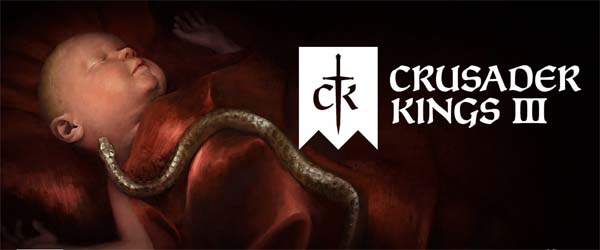
My blog readers know that I'm a fan of historic strategy games. Two of my favorite PC game franchises are Civilization and Total War, and I've dipped my hands into plenty of other historic strategy games ranging from the prehistoric Dawn of Man, all the way to Ultimate General: Civil War and Company of Heroes. But there's one prestigious set of historic strategy games that I've yet to get into. That is Paradox's historic strategy lineup of Crusader Kings, Europa Universalis, and Hearts of Iron. I own Crusader Kings II and Europa Universalis IV on Steam, and I've always wanted to get into them. I have a friend who plays them a lot, and the game looks really fun, but I was just never able to figure either of them out.
I tried booting up both a couple times and was just immediately overwhelmed. I tried the Crusader Kings II tutorial twice, and still didn't feel like I had a firm enough grasp on the game to feel compelled to keep playing. Part of that is because both games have myriad expansions and DLC that have just further complicated the games and repeatedly raised the bar of entry for newcomers. The only one of Paradox's tutorials that I felt gave me a reasonable grasp on the game was the tutorial for Stellaris.
When I saw previews for Crusader Kings III, I immediately put it on my watch list and committed myself to buying it day one, so that I could get in on the ground level in the hopes that it will be easier to grasp before Paradox starts releasing countless DLCs. It seems to have paid off, as I've been hooked on the game on and off since launch, and that addiction has cut into my Civ playing time, as well as delayed many of my blog projects and YouTube content. So for those of you eagerly awaiting new Civ strategies or the next installment of "How Madden Fails to Simulate Football", you can blame Paradox Interactive for the delay...
I am not the state
As someone who was never able to get into the previous game, I cannot say if Crusader Kings III is "dumbed-down" compared to its predecessor. It is, after all, still insanely complicated. But I definitely feel like it has a gentler learning curve and a much more effective tutorial compared to its predecessors. The hand-holding of the tutorial really did help me get a better understanding of how the various mechanics were working, and I've also found it much easier to navigate the revised U.I. and find the information that I'm looking for. I still feel like I have no idea what many of the U.I. panels mean, but I at least understand enough of the basics this time around to actually feel comfortable playing the game.
If you're unfamiliar, Crusader Kings is a medieval grand strategy game in which you play as the king of a small, European (or Middle Eastern or African) kingdom. You engage in diplomacy and court intrigue to increase your wealth and power, fight wars to conquer territory, and manage your growing holdings. But unlike a game like, say Civilization, you do not play as an abstraction of the state itself. Instead, you play as a line of rulers in a single family dynasty. You play as a single king (or queen) character at any given time. This king grows old, and eventually dies, at which point, you take control over you chosen heir and continue playing the game as that character. If you ever get to a point in which you have no family heir to carry on when you die, it's Game Over.
When your player character dies, you take over as that character's primary heir.
As much improved as the tutorial is, I do feel that it has one glaring weakness: it doesn't really cover succession. The tutorial basically puts you in control of a 40-year-old king in Ireland. It shows you how to press a few claims, use a casus belli to press those claims, create a title, deal with vassals, marry off a child, and then it basically just hands you the reigns and says "OK, now keep playing". And yeah sure, these are all the things that you spend most of the game doing. But I would say that arguably the most important part of the game is declaring your heir and setting up your inheritance to maximize the territory that your primary heir retains power over. I think succession is the single most important part of the game, and the tutorial doesn't cover it at all. When it finally happens, there's a tool tip that pops up to explain some stuff, but it didn't really help me all that much to understand what was happening, and a tool tip popping up after the fact certainly didn't help me to prepare for my king's inevitable death and inheritance. [More]
eb8fb312-cf3a-447e-aaf9-982c809e4e0e|0|.0
Tags:Crusader Kings, Crusader Kings 3, Paradox Interactive, Paradox Development Studio, strategy, grand strategy, RPG, history, simulation, medieval, king, Europe, crusades, war, casus belli, dynasty, inheritance
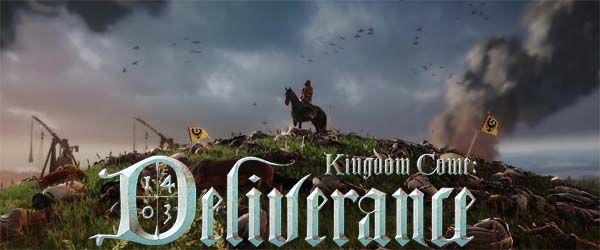
I tried. I really did. I wanted to give Kingdom Come: Deliverance a chance. I wanted to give it the benefit of the doubt.
I had been passively watching this game for a while, and was looking forward to its release. I didn't realize that it was a Kickstarter project. I thought it was just an independent developer self-publishing a game, like Hellblade: Senua's Sacrifice, which was friggin' awesome! So I didn't contribute towards the Kickstarter. But I did pay $60 for PS4 digital download of the game, and I deeply regret the decision.
If you're gonna charge the same retail price as a polished, publisher-backed game, then I expect the game to show something approaching that level of polish. Kingdom Come is just too wonky and unstable right now. Maybe in six or twelve months I might be able to pick it back up and enjoy it. As of now, however, I consider the game borderline unplayable.
Kingdom Come has ambitions to be Skyrim or The Witcher III, but it lacks the polish.
Scummy saves
The nail in the coffin is the game's restrictive and punitive save system. I'm a fan of diagetic save systems, and this particular save system could probably work really well if the game were just in a more stable and robust condition. I want to emphasize that this worked brilliantly in Resident Evil (and in survival horror in general) because the challenge and difficulty of survival horror came from having to manage a slowly dwindling supply of resources and health. Very few (if any) encounters outside of boss fights were even capable of bringing you from full health to dead, and even the boss fights were clearly telegraphed so that you had plenty of warning to go back, restock your supplies, and save. When to save (and whether or not to overwrite your previous save) became a part of strategy, especially in the case of Resident Evil with its limited,
inventory-space-consuming Ink Ribbons.
Reloading from savior schnapps makes you drunk.
Basically, Kingdom Come only auto-saves at the start of a major new quest. You can trigger a manual save by sleeping or by drinking a special type of rare and expensive alcoholic consumable. If you re-load after using the savior schnapps, the character is also inebriated. This seems, to me, to be an attempt to punish players for save-scumming. It also means that if you get tired or have to step away for whatever reason, and you didn't just complete a quest and are not in a convenient position to save (either lacking access to a bed, unable to risk being drunk when you reload, or simply don't have savior schapps), then you are just screwed.
Until this game gets to a more playable state, this save system needs to be relaxed immensely, or relegated to a "hard core" or "ironman" mode. Because the game is so bad at tutorializing mechanics and at presenting information to the player or warning you that what you're about to try to do won't work, save-scumming is almost necessary just to figure out how basic mechanics work in the limited opportunities that the game gives you to practice them. Tutorials drop walls of text on you without actually giving you an opportunity to practice the thing being tutorialized, so that you aren't given a chance to reinforce the concepts in your mind before the game moves on to something else. [More]
f6ada1a2-c15a-4d71-8aad-bdd16199aefc|1|5.0
Tags:Kingdome Come: Deliverance, Warhorse Studios, Deep Silver, RPG, medieval, Holy Roman Empire, Bovaria, save system, survival, sword, horse, open world
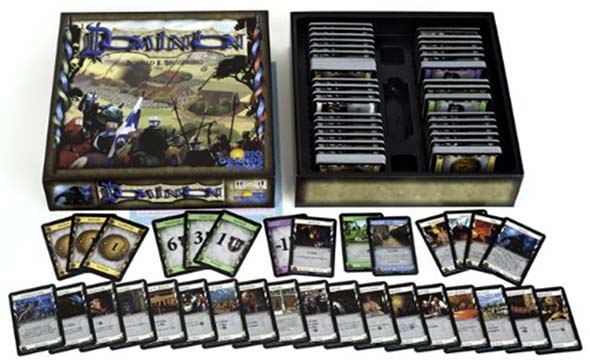
Dominion is a short and simple deck-building card game.
Most of the board games that I like are very long, epic games that take hours to play. Games like Civilization, Battlestar Galactica, and Eclipse can take four or five hours to complete - all of which can still be finished before I'm even done setting up Axis & Allies 1940!. But sometimes, my friends and I don't have hours to burn on a board game, and we need something shorter to play. Fortunately, I have a handful of shorter games as well. And one of the best and shortest games that I play is the deck-building game Dominion.
Dominion is an exceedingly simple game to learn, set up, and play. The basic concept is that each player spends money from his hand to buy kingdom cards to place in your deck. Each kingdom card has special abilities that you can execute when you play it from your hand, and the strategy of the game comes from which cards you buy and how you chain their effects together to maximize your ability to buy victory point cards. Each game will have a group of treasure cards and victory point cards, some of which are distributed to each player to form their starting hands. Each player receives seven "Copper" treasures and three "Estate" victory cards. Shuffle them, and draw five for your starting hand.
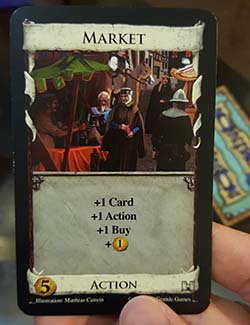
To play the game, simply follow the
directions printed on each card.
When your turn comes along, you can have an Action Phase and a Buy Phase. During the Action Phase, you play any "Action" cards from your hand and resolve their effects. During the Buy Phase, you play any treasure cards in your hand to purchase new cards to add to your deck. Each card has a cost to buy it, which is printed in the bottom corner. Certain cards will grant you additional actions or buys (i.e. the ability to split your treasure to purchase multiple cards of smaller value), and chaining them together efficiently is the key to victory.
There's very few actual rules to learn, since all the actions in the game are resolved by simply reading the effects from the card. The only things you have to learn are some of the game's basic vocabulary (e.g. "action", "buy", "gain", "discard", "trash", "attack", and so on). Once you know what all those words mean in relation to the game (and most of them are self-explanatory), you are ready to play! The result is a simple and elegant game that can be picked-up and played within a matter of minutes.
But this simple game also hides some serious depth and versatility... [More]
e3fc1c69-8f70-4575-a4de-76f7f3fa93a5|0|.0
Tags:Dominion, Rio Grande Games, board game, card game, deck-building game, medieval, renaissance, kingdom, victory point, treasure, shuffle, card protectors, Donald X. Vaccarino
|

| 12 | | | | | | | 60 | | 11 | | | | | | | 55 | | 10 | | | | | | | 50 | | 09 | | | | | | | 45 | | 08 | | | | | | | 40 | | 07 | | | | | | | 35 | | 06 | | | | | | | 30 | | 05 | | | | | | | 25 | | 04 | | | | | | | 20 | | 03 | | | | | | | 15 | | 02 | | | | | | | 10 | | 01 | | | | | | | 05 |
|